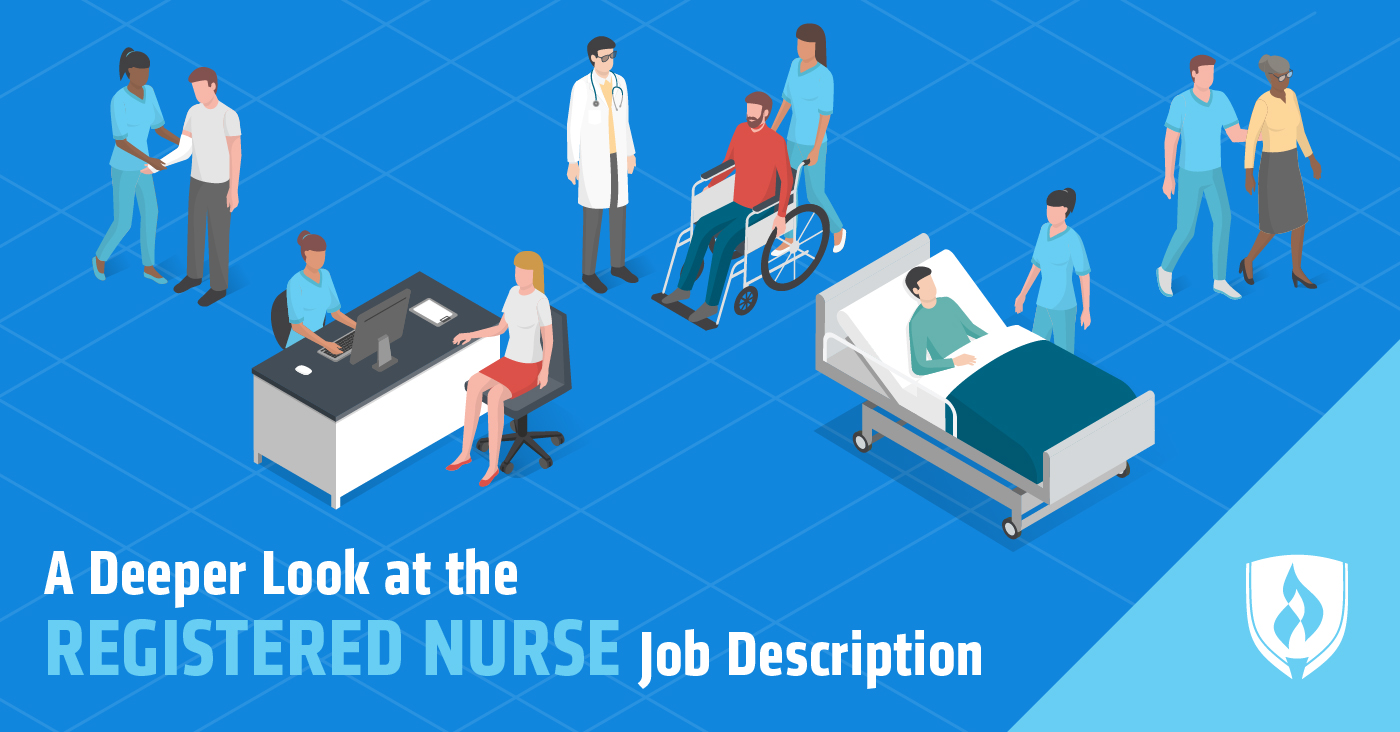
If you want to make an impact in the world, working as a registered nurse (RN) is one of the most effective paths to a rewarding career. RNs provide critical medical care and work closely with patients in many exciting and meaningful specialized capacities.
But what is the experience of an RN really like? In this article we’ll take a closer look at key registered nursing career information and share the insight of experienced nurses to dig into the things you won’t find in a job description.
Get Your Nursing School Questions Answered at a Nursing Information Session
Registered nurse job description details
There are certain things you can expect to find in any write up of a job description. This baseline information is important to determine if a particular position is what you're looking for or not. Take a look at some of the basic things you can expect from a registered nursing role.
Registered nurse job duties
It’s important to remember that the role of a “registered nurse” covers quite a bit of ground. Registered nurses work in a wide variety of specialized roles including emergency care, neonatal intensive care, gerontology, pediatrics—just to name a few. Each of these specializations will have nuances that affect their individual job descriptions.
That said, there are some general registered nursing duties found across nearly all specialized roles:
- Assisting with the administration of diagnostic testing and analyzing results
- Recording medical histories and taking vital signs
- Administering medication and monitoring for reactions or side effects
- Establishing plans of care
- Providing patients and families with education surrounding medical conditions and treatment
- Working closely with physicians and other members of a healthcare team
Registered nurse job settings
Name a healthcare setting and there’s a pretty good chance you’ll find a registered nurse employed there. Registered nurses working in hospitals, specialized clinics, outpatient facilities and long-term care facilities shouldn’t come as much of a surprise—but there are also roles within the military, school nursing and as an employee of insurance companies.
Where a registered nurse works is often tied to their training and if they’ve pursued a specialization. For instance, NICU and ER nurses are likely to spend more of their career working in a hospital setting, while oncology nurses are more likely to be found in working specialized clinics.
The community a registered nurse works in can also have an influence on the types of facilities (and specializations) available to them—a larger population served generally leads to more demand for specialized services.
Registered nurse salary and job outlook
According to the Bureau of Labor Statistics (BLS), employment of registered nurses is projected to grow 12 percent through 2028.1 The BLS attributes this strong growth projection to an increased emphasis on preventative care, higher rates of chronic health conditions and the expanding healthcare needs of the baby-boom generation.
Registered nurse educational requirements
A registered nurse must have either an associate’s or bachelor’s degree in nursing from an accredited program. RNs must then pass the National Council Licensure Examination (NCLEX) RN exam and finally apply for licensure in the state where they intend to work.
Becoming an RN won’t happen overnight, but once you attain your license you’ll have the opportunity to make a tangible difference in the lives of people in your community.
5 Things they don’t tell you in the registered nurse job description
Now that you have a better idea of the fundamental facts surrounding registered nursing jobs, it’s time to take a closer look at aspects of this role you might not find in a simple job description. We spoke with RNs across the country about their professional experience and found some unexpected aspects about the real life of a registered nurse.
1. The bond between RNs and patients can be strong
“The most surprising element of my job as a registered nurse is that my patients become part of my family,” says registered nurse and wellness blogger Awilla Rodriguez.
RNs provide critical care to patients throughout their course of treatment. In a hospital setting, this can mean several days building a close relationship with patients and their support systems. Listening to a patient’s family members not only builds a trusting relationship with patients, it can also provide insight into how to provide care.
“I get to meet a patient’s whole family and learn how to care for their specific needs,” Rodriguez says.
As an RN, you often step into peoples’ lives at a time of crisis. Those relationships can often last well beyond the time a patient spends in your care.
“I have had patients invite me to their weddings and even try to gift me with family heirlooms,” says RN Denna Babul. “I have even made life-long friends with patients I have treated.
2. You develop skills outside of healthcare
“You have to be a jack of all trades,” Babul states. “In a given day a nurse is a therapist dealing with family dynamics, a grief counselor who helps a patient or family begin to let go of what they have known and deal with new normals, an engineer fixing beds, sinks, IV poles, pumps, and wheelchairs, a mathematician calculating dosages, a crisis manager, a leader, and so much more.”
Medical care involves a lot of precise scientific knowledge, but the human element of healthcare means a good RN needs to adapt and improvise when things do not go as planned.
Nurses are asked to be leaders and administrators as well as their patients’ advocates within a complicated medical system. These demands create professionals whose skillsets cover fields far beyond medical procedural knowledge.
3. Your impact on patients’ lives goes beyond the clinic
A patient’s medical conditions can affect all parts of their life. It is no wonder that an RN’s work can touch on areas outside a patient’s medical treatment plan.
“Several moments after advocating for a family to get an adjusted school schedule,” says RN Amelia Roberts, “the mom said she was grateful that I was on her child’s side as an advocate. Other patients who we helped during trying teen years later have had children of their own and share baby pictures, stating how they loved the care we gave them.”
4. It is important to have a strong support system
Being an RN is an incredibly rewarding profession. But the pressure of being an essential part of a patient’s medical care can lead to burnout and chronic stress.
“It has been extremely helpful as an RN to have a mentor who I can consult and get guidance from regarding everything from industry pain points to professional career decisions,” says Julia Eze, RN and founder of The Nurse Link.
Many nurses utilize online forums to discuss issues or join professional networks. Strong relationships with other experienced nurses can provide guidance and social support through the rewards and challenges of a career as an RN.
5. Your educational journey might not end after nursing school
Though many RNs do not specialize, you may find as you gain experience in the field that you are drawn to a particular area of nursing. Given the incredible demand for clinical nurses such as nurse practitioners and nurse midwives, you may even choose to go back to school for an additional degree.
“Now more than ever, nurses are looking to go back to school for advanced practice,” says Eze.
The field of nursing is so large and dynamic, it is hard to know before you start nursing school where you will end up in ten years. You may find an unexpected passion working with premature infants or a knack for healthcare technology. An open mind to further opportunities within nursing could lead you to engaging and rewarding professional heights.
Do you have a future as a registered nurse?
Now that you know more about what goes into a registered nurse’s job description, are you interested in taking the next step toward becoming one? There’s plenty to learn while you’re in nursing school and it’s only natural if you’re a little concerned about whether or not you’ll be able to handle the challenges that come with it. Our article, “How Hard Is Nursing School? Students Tell All,” provides first-hand insight from nursing students about what to expect.
Related Articles:
1Bureau of Labor Statistics, U.S. Department of Labor, Occupational Outlook Handbook, [career information accessed November, 2019] www.bls.gov/ooh/. Information represents national, averaged data for the occupations listed and includes workers at all levels of education and experience.




